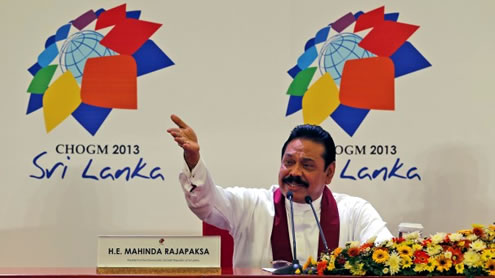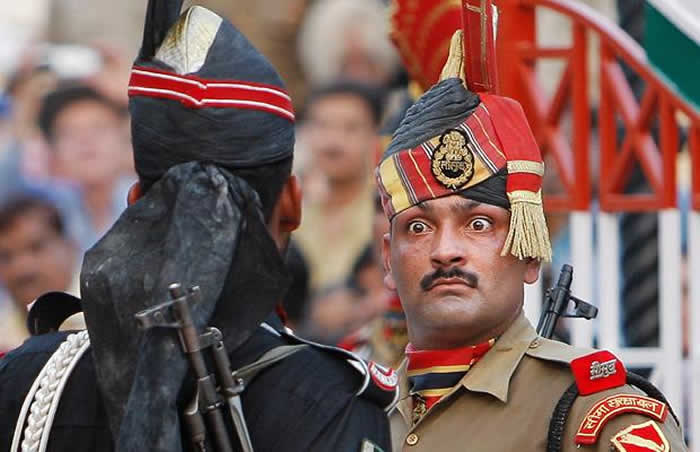 When the Commonwealth Heads of Government Meeting (CHOGM) — one of the more important international conferences of the year — starts in Sri Lanka’s capital, Colombo, today, there will be a notable absentee: Indian Prime Minister Manmohan Singh. His place will be taken by Salman Khurshid, India’s External Affairs Minister.
When the Commonwealth Heads of Government Meeting (CHOGM) — one of the more important international conferences of the year — starts in Sri Lanka’s capital, Colombo, today, there will be a notable absentee: Indian Prime Minister Manmohan Singh. His place will be taken by Salman Khurshid, India’s External Affairs Minister.
While the Indian government is trying to sugarcoat its decision not to send the Indian prime minister by pointing out that Indian prime ministers were not present at some other CHOGMs too, the circumstances surrounding this particular meeting clearly point to a big snub by New Delhi to Sri Lankan President Mahinda Rajapaksa.
Ironically, it was Khurshid himself who had earlier stated that it was important for India’s interests that the Indian prime minister attend CHOGM. He has now done a complete volte face, strangely discovering a variety of reasons why Singh’s presence was not really necessary and that his absence would not adversely affect ties between India and Sri Lanka. That is, of course, a piece of nonsense. The truth is that the compulsions of India’s domestic politics have taken precedence over foreign policy.
The main parties in Tamil Nadu, in particular the DMK which is allied with the Congress, had vociferously demanded that Manmohan Singh not go to Colombo. The DMK had even threatened to withdraw its support to the Congress party if he went. The Congress has now abjectly surrendered to virtual blackmail, showing its weakness and vulnerability. The looming general election, due by May 2014, for which the Congress needs whatever help it can possibly get, was also part of its devious calculations. Be that as it may, India is bound to cut a sorry figure in Colombo in the next few days.
The Commonwealth is a residue of what used to be the mighty British Empire on which, the boast went, “the sun never set”, so vast was its expanse worldwide. But with the end of World War II, the exhausted Western imperial powers were in retreat. They included the British. With gathering speed, their former colonies gained independence, some partly by violence, others largely peacefully (like India and Pakistan), and a few by the mere stroke of the pen.
Countries like Australia, New Zealand and Canada were mainly populated by Anglo-Saxons, while the others were peopled by Africans and Asians. Ethnically different, their main link was the English language and a veneer of British colonial heritage and culture. Some of them, again like India and Pakistan, adopted a British-style parliamentary democracy and a rule of law based on the British system of justice. CHOGM became a talking shop, a venue for exchanging ideas, but sometimes something more — such as when South Africa was expelled for its then notorious racial apartheid policy. Democratic values and human rights issues were sometimes aired as they probably will be this time as well.
Which is why the Colombo meet has considerable importance. Since Sri Lanka is a close and strategically important neighbour of India’s, the meet is equally significant for New Delhi. Hence the presence of its prime minister was essential. Sri Lanka ended almost three decades of a civil war fairly recently. The conflict killed tens of thousands, Tamils and Sinhalese, crippled the economy, and threatened Sri Lanka’s unity. Leaving aside rights and wrongs, there is no denying the fact that the Liberation Tigers of Tamil Eelam (LTTE), was one of the deadliest terrorism outfits the modern world has ever seen. Using child soldiers and women suicide bombers, it assassinated leading Sri Lankan politicians, including a president. Incredibly enough, Rajiv Gandhi’s government armed and trained the LTTE before turning against it and then sending Indian troops into Sri Lanka to subdue it. The LTTE had its revenge, by assassinating him.
The LTTE was ultimately destroyed, along with thousands of innocent civilians, at the end of the civil war, in a horrific fashion when human rights violations were undoubtedly committed on a huge scale. The trauma of that conflict persists and its wounds are still raw. The concerns of India’s Tamils are understandable, considering their close links with the Tamils of Sri Lanka, many of whom emigrated there centuries ago.
However, India is committed to the unity of Sri Lanka, though it favours a degree of autonomy for the Tamil-majority north. An election has already taken place there and a Tamil party taken office. Manmohan Singh’s presence in Colombo could have reinforced the peace process in Sri Lanka, while strengthening the demand for greater autonomy for the Tamils. Khurshid will doubtless attempt to do the same but cannot have the same clout as his prime minister. There is another angle to the issue. Beijing has been eyeing Colombo with more than a little interest, developing closer links through trade and commerce. New Delhi’s snub to Colombo is bound to be China’s gain. – Khaleejtimes












